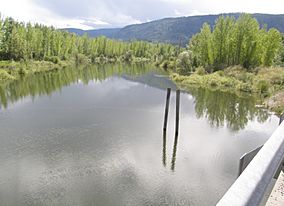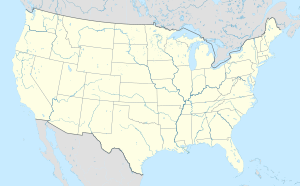Kootenai National Wildlife Refuge facts for kids
Quick facts for kids Kootenai National Wildlife Refuge |
|
|---|---|
|
IUCN Category IV (Habitat/Species Management Area)
|
|
 |
|
| Location | Boundary County, Idaho, United States |
| Nearest city | Bonners Ferry, Idaho |
| Area | 2,774 acres (11.23 km2) |
| Established | 1964 |
| Governing body | U.S. Fish and Wildlife Service |
| Website | Kootenai National Wildlife Refuge |
The Kootenai National Wildlife Refuge is a special protected area in northern Idaho, United States. It is a National Wildlife Refuge, which means it's a place set aside to protect wild animals and their homes. This refuge is about 20 miles (32 km) from the border with Canada. It is also about 5 miles (8 km) from the town of Bonners Ferry.
The refuge is surrounded by beautiful natural features. To the west, you'll find the Selkirk Mountains. The Kootenai River flows along its eastern side. State lands border the refuge to the south.
What is the Kootenai National Wildlife Refuge?
The Kootenai National Wildlife Refuge was created in 1964. Its main goal is to protect important places for waterfowl (like ducks and geese) during their long migrations. These birds travel thousands of miles each year. The refuge gives them a safe spot to rest, eat, and raise their young.
Diverse Habitats for Wildlife
This refuge covers a large area of about 2,774 acres (11.23 km2). It has many different types of natural homes, called habitats. These include wetlands, which are like marshy areas, and forests with both hardwood and evergreen trees. These varied habitats help many different kinds of animals thrive.
Animals Living at the Refuge
More than 300 different kinds of animals with backbones live at the Kootenai National Wildlife Refuge. It's a busy place! You can find many amazing creatures here.
Some of the animals you might see include:
- Coyotes
- Grizzly bears
- Elk
- Bald eagles
- Great horned owls
- Moose
- Beavers
- Kestrels
- River otters
- Red-tailed hawks
- White-tailed deer
- Thirteen different kinds of bats
- Northern harriers
- Black bears
The refuge is managed by the U.S. Fish and Wildlife Service. They work hard to keep this area safe and healthy for all the wildlife that calls it home.
 | Isaac Myers |
 | D. Hamilton Jackson |
 | A. Philip Randolph |


